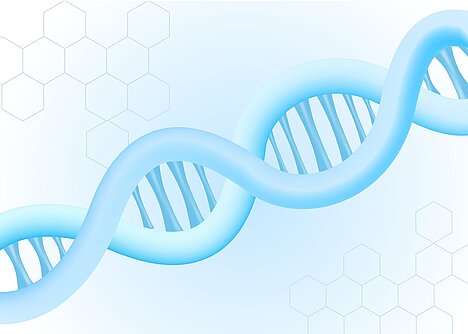Nucleotides

Nucleotides are important for your dog. In this article you can find out more about these biomolecules, which are considered the basic building blocks of life.
What are nucleotides?
Nucleotides are organic compounds that consist of a sugar, a phosphate and a nitrogen part. They form the building blocks of nucleic acids (DNA and RNA), which store our genetic information and pass it on to each new cell. They are also involved in the formation of proteins, which are necessary for all metabolic processes in the body. Nucleotides also provide energy for the cells and are involved in the production of the body's own enzymes and hormones.
How do nucleotides get into your dog's body?
Your dog can produce some of the nucleotides he needs himself, but he also needs an external source from his diet. The most important sources of nucleotides in dog food are meat, fish, offal and yeast. These foods contain mainly purine nucleotides (adenine and guanine), which are easier for dogs to digest than pyrimidine nucleotides (cytosine, thymine and uracil).
What are the benefits of nucleotides for your dog?
Nucleotides can help your dog in various situations to improve or maintain his health. For example, they can:
- Aid digestion: Nucleotides support the function of intestinal cells and increase the absorption of nutrients. They can also help with diarrhea or inflammation in the intestines.
- Strengthen the immune system: Nucleotides stimulate the production of antibodies and immune cells that fight against pathogens. They can also be useful for allergies or autoimmune diseases.
- Accelerate regeneration: Nucleotides promote cell division and renewal, which is especially important in cases of injury or surgery
- Support growth and development: Nucleotides are particularly important for puppies and young dogs as they promote the formation of bones, muscles and nerves. They can also help with imprinting and learning.
Are there any disadvantages or risks associated with the administration of nucleotides?
The administration of nucleotides as a dietary supplement is generally safe and has no known side effects. However, there are a few points to bear in mind:
- The dosage: The optimal amount of nucleotides depends on various factors, such as your dog's age, state of health and activity level. Too much or too little can impair the effect or even be harmful. You should therefore always follow the recommendations of the manufacturer or your vet.
- Quality: Not all nucleotide products are created equal. You should make sure that you choose a high-quality product that comes from natural sources and contains no artificial additives. You should also check the expiry date and store the product in a cool, dry place.
- The interactions: Nucleotides can increase or decrease the effects of other medications or supplements. For example, they can affect blood clotting or increase uric acid levels. You should therefore inform your vet if you give your dog nucleotides.
Nucleotides are important biomolecules for your dog's health. They can help him in many situations to improve his digestion, immune system, regeneration and growth. However, you should follow a few rules to achieve the best effect and avoid possible risks.
If you notice any signs of hypersensitivity or poisoning in your dog, you should see your vet immediately. We are not a substitute for a vet, but we try to be as accurate as possible. Every dog reacts differently and we recommend you get a second opinion or consult your vet if in doubt.
Stay healthy and take good care of your four-legged friend!😊